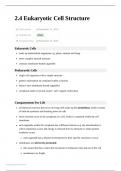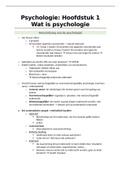2.4 Eukaryotic Cell Structure
First review @September 13, 2023
Practise Q's Done
Second review @September 23, 2023
Eukaryotic Cells
make up multicellular organisms e.g. plants, animals and fungi
more complex internal structure
contains membrane-bound organelles
Prokaryotic Cells
single cell organisms with a simple structure
genetic information nit contained within a nucleus
doesn’t have membrane-bound organelles
cytoplasm made of cytosol (water+ salt+ organic molecules)
Compartments For Life
all chemical reactions that occur in living cells make up the metabolism, which consists
of both the synthesis and breaking down of cells
these reactions occur in the cytoplasm of a cell, which is contained within the cell
membrane
each organelle within the cytoplasm has a different function e.g. the mitochondria is
where respiration occurs and energy is released from it, ribosome is where protein
synthesis occurs
each organelle has a distinct environment for their specific reactions to occur
membranes are selectively permeable
this means that they control the movement of substances into and out of the cell
membranes are fragile
2.4 Eukaryotic Cell Structure 1
, Function of eukaryotic organelles
Nucleus
contains genetic information in the form of deoxyribonucleic acid (DNA) — this
directs all the protein synthesis required by the cell
DNA controls metabolic activity since most of the proteins synthesised are
enzymes which are required for metabolic activity
DNA associates with proteins histone to form chromatin which coils up to
form chromosomes which are only visible when they thicken and condense
ready for mitosis
the nucleus is contained within a double membrane called the nuclear envelope this
protects the nucleus from damage
the nuclear envelope contains nuclear pores which allows molecules to move in
and out of the nucleus. DNA is too large to leave through the nuclear pores so it
leaves in the form of messenger ribonucleic acid (mRNA) so that protein
synthesis can occur at the ribosome
Nucleolus
found within the nucleus and is responsible for producing ribosomes
made of proteins and RNA, which is used to make ribosomal ribonucleic acid
(rRNA) — this is then combined with proteins the ribosomes for protein synthesis
2.4 Eukaryotic Cell Structure 2
First review @September 13, 2023
Practise Q's Done
Second review @September 23, 2023
Eukaryotic Cells
make up multicellular organisms e.g. plants, animals and fungi
more complex internal structure
contains membrane-bound organelles
Prokaryotic Cells
single cell organisms with a simple structure
genetic information nit contained within a nucleus
doesn’t have membrane-bound organelles
cytoplasm made of cytosol (water+ salt+ organic molecules)
Compartments For Life
all chemical reactions that occur in living cells make up the metabolism, which consists
of both the synthesis and breaking down of cells
these reactions occur in the cytoplasm of a cell, which is contained within the cell
membrane
each organelle within the cytoplasm has a different function e.g. the mitochondria is
where respiration occurs and energy is released from it, ribosome is where protein
synthesis occurs
each organelle has a distinct environment for their specific reactions to occur
membranes are selectively permeable
this means that they control the movement of substances into and out of the cell
membranes are fragile
2.4 Eukaryotic Cell Structure 1
, Function of eukaryotic organelles
Nucleus
contains genetic information in the form of deoxyribonucleic acid (DNA) — this
directs all the protein synthesis required by the cell
DNA controls metabolic activity since most of the proteins synthesised are
enzymes which are required for metabolic activity
DNA associates with proteins histone to form chromatin which coils up to
form chromosomes which are only visible when they thicken and condense
ready for mitosis
the nucleus is contained within a double membrane called the nuclear envelope this
protects the nucleus from damage
the nuclear envelope contains nuclear pores which allows molecules to move in
and out of the nucleus. DNA is too large to leave through the nuclear pores so it
leaves in the form of messenger ribonucleic acid (mRNA) so that protein
synthesis can occur at the ribosome
Nucleolus
found within the nucleus and is responsible for producing ribosomes
made of proteins and RNA, which is used to make ribosomal ribonucleic acid
(rRNA) — this is then combined with proteins the ribosomes for protein synthesis
2.4 Eukaryotic Cell Structure 2




